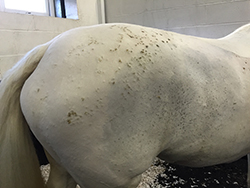
Itching or ‘pruritus,’ as it is known in veterinary terms, is an unpleasant sensation that triggers a desire to scratch. Horses are often seen to bite, rub or chew their skin which can be very distressing for horses and owners alike. Not only can horses inflict a significant amount of self-trauma but fencing, field shelters and stabling will often get harmed in the process too! Horses may rub themselves to the point of removing their fur/hair and damaging the underlying skin resulting in raw sores that may become infected. Hives (urticaria) may accompany the itching depending on the cause.
Working with your vet is really important to try establish the cause of the ‘pruritus’. This will in turn enable treatment and preventative strategies to be put in place. There are many tests which can be performed including analysing hair or skin samples down the microscope, taking skin biopsies or performing intradermal allergy testing in our clinic.
Causes of pruritus include but are not limited to the following:
Ectoparasites or infectious agents including:
· Lice
· Mites
· Biting flies and insects
· Pinworm
· Fungi
· Bacteria
Immunological causes including:
· Atopic dermatitis (allergic reaction to an environmental allergen)
· Culicoides hypersensitivity (sweet itch)
· Contact hypersensitivity
· Food allergies
Other miscellaneous causes including:
· Drug reactions
· Liver (hepatic) dysfunction
· Pruritus secondary to internal cancerous lesions
Treatment
Many different treatments are available depending on the cause. These may include shampoos, sprays, topical creams, worming, antibiotics, anti-inflammatories, anti-histamines, avoidance strategies or allergen specific immunotherapy.
If you have any concerns regarding your horse’s skin whether there are lumps, bumps or ‘pruritic’ areas, please have a chat with our equine team. We can help advise you on the best course of action and get to the bottom of why your horse may be pruritic.
